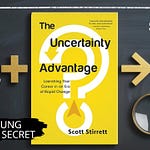You’ve built the team. Made the numbers. Earned the title.
So why does success feel so lonely?
I recently sat down with Angie Lion—someone who spent years in operating rooms where bad leadership could literally kill people. She’s now Chief Soul Officer at Black River Performance Management, and what she’s learned about leadership will challenge everything you think you know.
Here’s the uncomfortable truth she shared: 87% of leaders feel like imposters.
Not struggling entrepreneurs. Not first-time managers.
Successful, accomplished, respected leaders.
The kind who look confident in meetings but lie awake at 3 AM asking: “Am I actually cut out for this?”
The Operating Room Reveals Everything
Angie didn’t start in boardrooms. She started in operating rooms as a certified surgical technologist.
“I naively thought I’d be working with professionals,” she told me. “Not just in their craft, but in their behaviors.”
She was wrong.
The operating room became her laboratory for understanding leadership. Patients are asleep. Stakes are high. And behaviors show up that would never surface in a normal workplace.
She watched two types of leaders emerge:
Type 1: Orchestrators who could make teams bend over backwards for them. People who created psychological safety where mistakes were caught early and patients received exceptional care.
Type 2: Power wielders who used fear to control. People who made teams so anxious that mistakes multiplied and patient care suffered—even though everyone genuinely wanted to help.
The difference wasn’t surgical skill. It was self-awareness.
What AI Will Never Replace
Here’s where it gets interesting.
Angie introduced me to a concept most leaders have never heard of: Transitional Intelligence (TQ).
You probably know Emotional Intelligence (EQ)—understanding your emotions and others’ emotions to navigate relationships effectively.
But Transitional Intelligence? That’s your ability to move through change with intention.
“While EQ helps you feel your way through the moment,” Angie explained, “TQ helps you move through the moment—especially when you’re standing in that uncomfortable space between what was and what’s coming next.”
Think about that.
We’re living through massive disruption—AI, remote work, economic uncertainty, generational shifts. Most leaders are drowning in reactive mode, swimming harder but going nowhere.
TQ is the skill that lets you adapt without losing yourself in the chaos.
And it’s completely learnable.
The Real Root Cause
After working with hundreds of leaders, Angie discovered something profound about why we struggle:
“It always comes back to two core beliefs: ‘I’m not enough’ or ‘I’m not safe.’”
Read that again.
That voice at 3 AM? It’s not about the quarterly numbers or the difficult employee. It’s about these deeper beliefs running in the background of your subconscious.
And here’s the kicker: these beliefs drive most of our leadership behaviors.
The perfectionism. The overworking. The inability to delegate. The need to be right in every meeting.
All protection mechanisms against feeling “not enough” or “not safe.”
The Unlearning Paradox
“The more you learn about leadership,” Angie said, “the more you realize you need to unlearn.”
This hit me hard.
Most of us got our leadership patterns from observation—bosses we had, parents who raised us, survival mechanisms we developed. Much of it isn’t actually serving us anymore.
Angie calls it “chipping away the things that got you where you are, but won’t help you go further.”
For her, one of the biggest unlearnings was asking herself: “Do I want to be right, or do I want this relationship?”
She grew up in an environment where she learned to “cut someone down with her tongue in about two seconds.” That skill helped her survive. But it was destroying her relationships with her kids and her teams.
The shift came when she chose relationship over being right.
Micro-Cultures of Excellence
Here’s the most empowering insight from our conversation:
You don’t need to wait for your entire organization to change.
One self-aware leader can create a micro-culture where people thrive—even inside a toxic organization.
Angie saw this repeatedly in hospitals. The same building, same policies, same systemic problems. But one operating room would have a culture of excellence while another was chaotic—all because of the leader in that space.
“You get to shape your team culture,” she said. “Even if the hospital is a shit show, that leader can create an environment where people flourish.”
This is revolutionary.
You have more power than you think.
The Skills That Matter Most
When I asked Angie what leaders should focus on, she was unequivocal:
Human skills. Communication. Emotional intelligence.
“The more we get into technology and AI,” she explained, “the more these skills will set you apart. You’re more likely to get promoted, make more money, and have a better life in general.”
Not because you’re trying to compete with AI.
But because you’re developing the irreplaceable capacity to connect, empathize, listen, and create psychological safety.
These aren’t soft skills. They’re survival skills for the future of leadership.
What This Means for You
If you’re reading this and feeling that familiar 3 AM anxiety, here’s what I want you to know:
You’re not broken. You’re just unconsciously programmed.
The feelings of “not enough” and “not safe” aren’t personal failures. They’re human experiences that show up when you’re genuinely trying to lead well.
The path forward isn’t about working harder or proving yourself more.
It’s about:
Building self-awareness - Understanding your triggers, patterns, and blind spots
Developing TQ - Learning to move through change without losing yourself
Listening deeply - As Angie says, “two ears, one mouth for a reason”
Creating safety - For yourself and your team
Unlearning - Releasing the patterns that got you here but won’t take you further
Choosing relationship - Over being right, every single time
The Question That Changes Everything
Angie shared something that’s been sitting with me:
“Are you sick of your own BS yet?”
Not as judgment. As invitation.
An invitation to stop the justifications, the excuses, the same patterns that keep you stuck.
An invitation to face what’s real, get help, and do something different.
Because here’s the truth: Leadership isn’t about being right. It’s about being real.
Not about having all the answers, but asking better questions.
Not about being perfect, but being present.
The world doesn’t need more leaders who can fake confidence.
It needs leaders who can stand in their truth, acknowledge their humanity, and create spaces where others can do the same.
That’s the kind of leader who changes everything.
Listen to my full conversation with Angie Lion on The Self Aware Leader Podcast. We go deeper into Transitional Intelligence, the specific practices that build self-awareness, and how to create micro-cultures of excellence.
Angie’s upcoming book Connect with her at BlackRiverPM.com. https://blackriverpm.com/leadership/angie-lion/
If this resonated, I’d love to hear from you: What keeps you up at 3 AM as a leader? Reply to this email—I read every response.
Until next time, lead from wisdom, not worry.
— Jason
P.S. If you know a leader who needs to read this, forward it to them. Sometimes the most powerful thing we can do is let someone know they’re not alone in the struggle.











